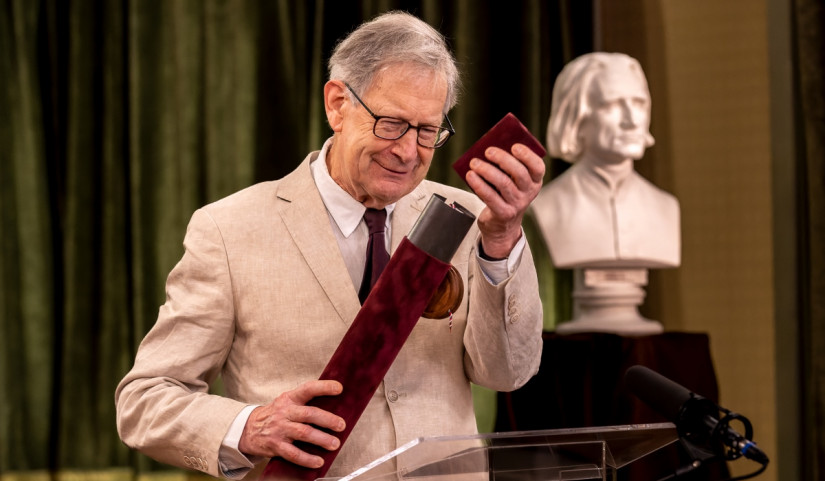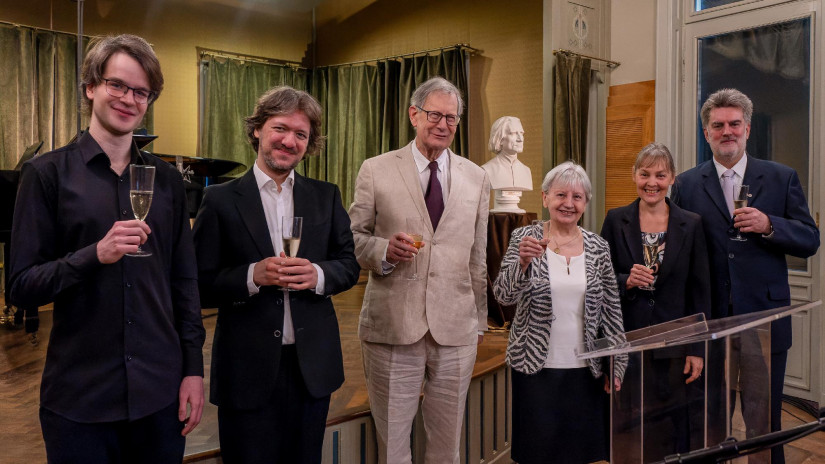Sir John Eliot Gardiner Awarded Honorary Doctorate by Liszt Academy
The world-famous conductor received the certificate from President Dr. Andrea Vigh.
“Sir John Eliot Gardiner is a genuine and outstanding representative of the international music scene, whose professional achievements have been the subject of intense attention for decades. He is an iconic figure in both the research and the production of historically informed performance”, the president stressed in her speech. She said that the institution gave this honour only on exceptionally, with renowned violinist Yehudi Menuhin being the last awardee 20 years ago. The list of honorary doctors also includes Lajos Bárdos, Pál Kadosa and Antal Molnár.

Sir John Eliot Gardiner (photo: Liszt Academy/Andrea Felvégi)
In her laudation, Katalin Komlós, professor emeritus of the university and a researcher of 18th century keyboard music and performance practice, said: “After his studies in Cambridge, young Gardiner decided to dedicate his brilliant talent and his life to the cultivation and service of music.” As she pointed out, his intellect as a historian is as much a part of his life’s work as his charisma and magical power in performing. The professor listed some of the highlights of Gardiner’s repertoire: Handel’s Dixit Dominus, Beethoven’s Missa Solemnis, Brahms’s German Requiem, the Bach Cantata Pilgrimage project and several works by Mozart. Sir John Eliot Gardiner is also a notable scholar, for example, in 2013 his book Music in the Castle of Heaven: A Portrait of Johann Sebastian Bach’’ was published. She added that being a performer and a scholar required two very different personalities, but they reinforce each other in the scene of historically informed performing.

From left to right: Fülöp Ránki, Ádám Banda, Sir John Eliot Gardiner, Katalin Komlós, Dr. Andrea Vigh and Dr. Csaba Kutnyánszky (photo: Liszt Academy/Andrea Felvégi)
Sir John Eliot Gardiner said that he had received many honours, but this is a special and moving experience for him. “There are honours one accepts with a thank you, but the title of Honorary Doctor of Liszt Academy is very meaningful, very profound and a huge honour due to the distinguished history of Liszt Academy and the whole tradition of Hungarian music, which is immensely important and valuable, so I am very grateful”, he added.
One of the greatest conductors of our time, Sir John Eliot Gardiner is a pioneer of historically informed performance, specialising in composers such as Monteverdi, Bach, Mozart and Beethoven, but also Brahms, Berlioz, Massenet, Bizet, Ravel and Schumann. Born in April 1943, he studied history and music at King’s College, Cambridge University, where he studied the latter with Thurston Dart, and was taught in Paris by Nadia Boulanger too. He is the founder and conductor of the Monteverdi Choir, the English Baroque Soloists and the “Orchestre Révolutionnaire and Romantique”, as well as regularly conducting modern instrumental ensembles. During his career he has received numerous awards and honorary titles.
The laudatory ceremony featured young talents: pianist Fülöp Ránki, Liszt Academy’s doctoral student who played Liszt’s Pater noster. He also played the second movement of Bartók’s Rhapsody No. 1 with violinist and associate professor Ádám Banda.
Below you may read the laudation by Katalin Komlós.
Arnold Schönberg once made a rather unusual statement about the duality of music:
“The performer is totally unnecessary except as his interpretations make the music understandable to an audience unfortunate enough not to be able to read it in print.”
The theorist Heinrich Schenker went even further:
“A composition does not require a performance in order to exist. … The reading of the score is sufficient.”
Perhaps I am not alone in my view, that music, the most spiritual of the arts, exists primarily in sound, that goes “from the heart to the heart”, as Beethoven expressed it in the dedication of his great Missa Solemnis. The sacred task of the performer is to transmit the composer’s message, preserved in the printed score, to the intended audience. The greater the masterpiece, the greater is the responsibility of the mediator.
When the young John Eliot Gardiner, after studying history at King’s College, Cambridge, decided to devote his life and splendid talent to the cultivation and service of music, he undertook the mission of being a mediator of the music of the greatest masters of music history. Following the encouragement of his professor, Thurston Dart, he took the bold step of conducting a performance of Monteverdi’s Vespro della Beata Virgine in King’s College Chapel, at the age of 21. This was the beginning of the journey, el camino, the most important stages of which were the foundation of the Monteverdi Choir in 1964, the birth of the English Baroque Soloists in 1978, and the creation of a new orchestra, the Orchestre Révolutionnaire et Romantique in 1990.
The start of this momentous career coincided with the spreading movement of historical performance in music, and the young Gardiner at once recognized the manifold potential gained from the research of the contemporary sources and documents, the use of period instruments, and the investigation of the cultural context and performance practice of the individual historical periods. His imagination, with the background of his wide intellectual scope and rare musicianship, has truly re-created the wonders of European music history for us, from his favourite Monteverdi, through the music of Bach, Mozart, Beethoven, to the works of 20th-century composers like Britten and Stravinsky. When you approach each era and each master afresh, proceeding across the centuries, the horizon opens up gradually, and instead of retrospection you gain an expansion through the new discoveries. The members of Maestro Gardiner’s two wonderful ensembles, the Monteverdi Choir and the English Baroque Soloists, have been true collaborators in this singular adventure.
The use of appropriate instruments for different time periods and styles is certainly one of the important tools of historically informed performance. By itself, however, it is no guarantee for an enthralling interpretation. Beyond the specifically musical considerations, a deep understanding of the Zeitgeist, and a thorough knowledge of the original performance conditions of the period are indispensable for an insightful evocation of the masterworks of the past. The intellect of John Eliot Gardiner the historian is just as much an integral part of his achievement as his charisma and the magical power of his musicianship. When he speaks about his favourite Monteverdi, “the Shakespeare of music” (in his own words), he places him among famous contemporaries like Galileo, Kepler, Caravaggio; so when tha magnificent music resounds under his direction, we experience not only the splendour of Venice, but the incomparable spirit of that glorious period as well. In the same way, his Bach breathes the Pietism of 18th-century Thuringia and Saxony, and behind his Beethoven looms the historic tableau of the French Revolution.
It would be difficult to name the most outstanding productions from Maestro Gardiner’s incredibly rich répertoire: the list is too long. The galvanizing excitemenr of Handel’s Dixit Dominus; the sheer beauty of Mozart; the sublime ecstasy of Beethoven’s Missa Solemnis; the dark, but serene visions of death and everlasting life in Brahms’s Deutsches Requiem shine like illuminating stars in the memories of music-lovers. And, of course, Johann Sebastian Bach. I would not be surprised if the memorable Bach Cantata Pilgrimage in 2000, when Maestro Gardiner and his musicians performed and recorded all Bach’s church cantatas on the appropriate Sundays within a single year, in more than 60 churches throughout Europe and in America, did not turn out to be the most significant salute ever made before the greatest Creator in musical history. But John Eliot Gardiner, the scholar, offered his salute as well in 2013, when he published his admirable book, Music in the Castle of Heaven: A Portrait of Johann Sebastian Bach.
The performer and the scholar imply very different personalities. Yet, in the field of historically informed performance the two areas complement, even reinforce one another. Musical scholarship is indispensable here, but only as a background to the gift of musicianship. Maestro Gardiner, the present spiritus rector of this pioneer vanguard, is a musician of the highest order: the vitality and the magnetism of his performances transmit the emotions, thoughts, and passions of the music to the members of his ensembles, and through them, to audiences around the world.
Among numerous awards in recognition of his work, Maestro Gardiner holds several honorary doctorates from various distinguished universities. Now the Liszt Ferenc Academy of Music of Budapest joins these institutions, to represent the respect and gratitude of all music-lovers of Hungary, who have received an invaluable portion of the living tradition of European cultural history through the artistry of Sir John Eliot Gardiner.


